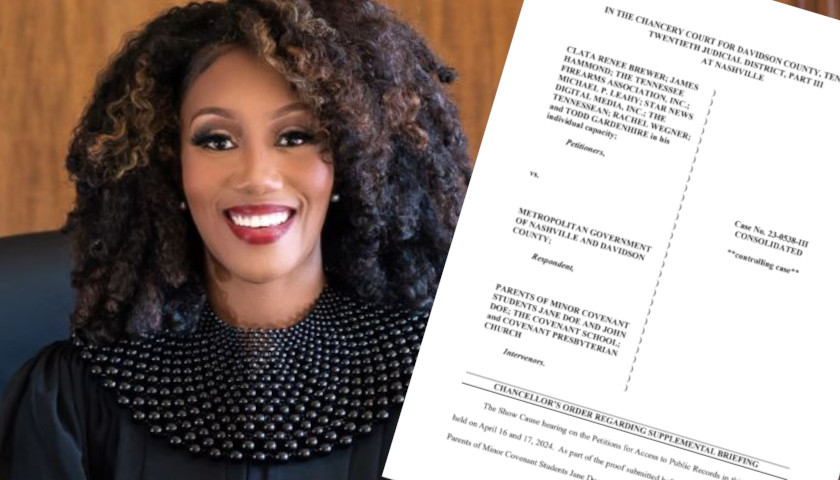Live from Music Row Thursday morning on The Tennessee Star Report with Michael Patrick Leahy – broadcast on Nashville’s Talk Radio 98.3 and 1510 WLAC weekdays from 5:00 a.m. to 8:00 a.m. – host Leahy welcomed all-star panelist Clint Brewer in-studio to discuss Governor Bill Lee’s unexpected victory in the Tennessee Supreme Court his Education Savings Account Pilot Program, and explain the relationship between a county government and local education authorities.
Leahy: In-studio, all-star panelist, good friend, recovering journalist, and public affairs specialist Clint Brewer. Clint, this is the kind of story that you and I love to talk about because it’s a little in the weeds.
Brewer: Down in the weeds, lots of minutiae.
Leahy: It’s a little bit in the weeds.
Brewer: Not made for radio at all.
Leahy: I don’t know, I think our listeners may kind of find it interesting to have two political nerds kind of get into the weeds on this.
Brewer: We had a clap-back from a listener last week. Like, “no, I like all this.”
Leahy: That one listener? There’s more. Actually, I keep hearing a lot of people like the in-depth discussion. About this case now. The decision was 3-to-2, and those who were in the majority were Chief Justice Roger Page, Justice Jeffrey Bivins, and Special Judge Thomas Frierson.
I’ll get to that in a moment. Dissenting were Justice Sharon Lee, who was appointed by Governor Bredesen, and Holly Kirby, Justice Kirby, who I think was appointed by Governor Haslam.
So that’s a little bit of surprise that she took that viewpoint on it. What’s interesting is the case was originally heard on June 3, 2021, but due to the untimely passing of Justice Cornelia Clark, one of the 5th justices, the case was re-argued on February 24th of this year.
But the current replacement for Justice Clark wasn’t up to speed by that time – Sarah Campbell, who’s now the fifth justice appointed by Governor Lee and confirmed by the Tennessee General Assembly.
Judge Thomas Frierson, who’s been a court of appeals judge since 2013, was named to be a special judge and participated in that re-argument on February 24 and became basically the deciding vote in this. So that’s sort of the ballpark on it.
And so I think it was quite interesting to see. And I think it was decided on this very narrow issue, but I think it was decided correctly now that we look at how the home rule amendment is set up, and who it applies to. And I want to get back to this thing about the relationship between a county government and a local education authority.
Brewer: We’re going to oversimplify it a little bit. But the ruling said that essentially the state’s home rule law doesn’t apply to local education authorities.
And really, if you look at the way local government is set up, local education, LEAs, and local school systems enjoy a fair amount of autonomy. Some of them even have their own taxing authority.
Leahy: Let’s talk about that. The dissenters in this case, Justice Lee and Justice Kirby, said, oh, yeah, the county and the local education authority, that is funded by the county. They’re basically one and the same. That was their argument. I don’t think that’s actually quite true.
Brewer: It’s not. Let’s set Metro aside. You don’t have to. But, I mean, every county has got an executive officer. In the Metropolitan government, it’s the mayor.
Some places it’s called the county mayor. Some places it’s called the county executive. But at the end of the day, you’ve elected an executive branch officer, and they have a legislative branch.
And so the county mayor, let’s just call it that. And the county commission in most of Tennessee’s 95 counties, what happens is they fund the school system, and then an elected board of school members decides what the school system budget will be and what the policies will be, and who will lead the school system, which is a hired director of schools.
Leahy: So there’s a lot of autonomy after the funding happens. Basically, the county has nothing to do with the school system after the funding. Is that right?
Brewer: And then take it one step further. There are other government public school systems that exist outside of the system we just described.
So you also have in Tennessee, and this dates back to when the state was more of an agrarian society, where there are parts of counties that had to literally build their school calendar around children being available to help with agriculture, with the harvest.
And so you have special school districts that are out there, and they don’t report to anybody. There’s not even a relationship with a county or a city government in some cases. And they have their own taxing authority.
They can actually levy a tax on their territory. So, school systems in this state traditionally and legally have enjoyed a lot of autonomy, which, ironically, is somewhat where this law came from. Because in Davidson and Shelby counties …
Leahy: Was it the law? The pilot program law.
Brewer: Because the school systems enjoy so much autonomy, despite mayor after mayor after mayor coming through places like Nashville and saying, we got to fix the school system. It hasn’t been fixed.
And so the law is to allow – the law does several things, but primarily it allows people to take their tax dollars and vote with their feet in a failing school system.
Leahy: If you’re under the law, if you’re in a failing school in Shelby County now or Davidson County, you can take that money and you can go elsewhere with it.
Brewer: You can go to a private institution.
Leahy: And it’s your money to control, that goes with the students.
Brewer: I think they’ve chafed at this, but it’s essentially a voucher.
Leahy: Well, it’s been described in all the press reports as vouchers. In its opinion, the Tennessee State Supreme Court called it a voucher permit.
Brewer: Right. And so it still has to go back to the trial court. Let’s be clear. This is not some holistic victory. It has to go back to the trial court.
Leahy: But the key issue that was brought up in this case, does it violate the home rule amendment constitution? It’s pretty clear.
Brewer: The state constitution. Now they’re going to argue the federal Constitution.
Leahy: I don’t think it’s going to have much success, but we’ll talk about that in a minute. But here’s the thing. Now, this has been a pet peeve of mine.
So you go in and you think oh, the mayor and the council or the mayor and the county commission, they can tell the schools don’t do this, don’t do this curriculum. And they can’t [dictate curriculum].
All they do is, the LEA, presents them with a budget, one number, whatever it is. Once that budget is approved, how it’s spent, even by line item, the school system can change it, and they often do.
Listen to the interview:
– – –
Tune in weekdays from 5:00 – 8:00 a.m. to The Tennessee Star Report with Michael Patrick Leahy on Talk Radio 98.3 FM WLAC 1510. Listen online at iHeart Radio.








